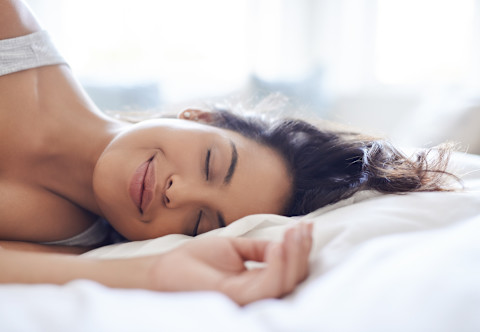
You've probably heard the surprising (but not really surprising) stat that we spend a third of our lives sleeping. And it's likely the reason why, when life gets busy, sleep is one of the first things we'll sacrifice. Between work, friends, and family, who has time for a full night's slumber anyway? And what's so bad about staying up late during the week if we can just get more zzz's on the weekend?
The truth is, your sleeping habits can affect your overall health just as much as the habits you have when you're awake. And it's more than making sure you get seven hours of it every night: Understanding the truth about what's actually helpful—and harmful—for good, quality sleep goes a long way.
Below, we debunk three of the most common misconceptions about getting a good night's rest. And you'll want to listen up because believing any of these can limit your potential for healthy sleep and ultimately, a healthy life.
Myth: You can always "catch up" on sleep on the weekends.
Who doesn't use this excuse to rationalize a spell of sleep procrastination when it's past bedtime? According to the Centers for Disease Control and Prevention1 (CDC), adults generally need at least seven hours of sleep each night for our bodies to properly function and stay healthy. We literally have a built-in system—our circadian rhythm—to nudge us when it's time to get some shut-eye and, later, when it's time to wake up.
While your body can handle one night of missed sleep, it's important to remember that snoozing those extra hours later on is not the same thing as getting a full night's rest every night. Research has shown that it takes four days2 to fully recover from one hour of lost sleep (yikes), and trying to pay back chronic "sleep debt" can increase your likelihood of sleep deprivation symptoms, affecting your quality of life in return. Ideally, plan for the appropriate hours of sleep you need each night to keep a regular sleep schedule.

Myth: You can train yourself to be a "short sleeper."
This is a big one. The belief that your body can run on fewer hours of sleep as you get older—or that your brain can somehow adjust to shorter periods of sleep—can trick even the most faithful bedtime abiders among us. The proof? Research by the National Sleep Foundation3 revealed that nearly 70% of us aren't getting the recommended hours of sleep on the regular.
Besides the fact that the CDC called sleeplessness a public health problem in 20184, allowing sleep loss to continue over time simply doesn't bode well for our mental and physical health. We know that the long-term consequences of sleep deprivation5 include an increased risk for heart disease, diabetes, and depression. On the flip side, a full night's sleep—the recommended seven hours at least—gives you more restorative REM sleep, the stage in your sleep cycle when your body and brain store memories and regulate mood and learning.
There really isn't a shortcut around it—we simply have to make sure we get the restorative sleep our bodies and minds need nightly. If you know you have trouble falling asleep at night, occasionally supplementing with melatonin—the hormone that triggers tiredness in our circadian rhythm—can be a big help. Nature Made's Melatonin comes in 3 mg or 5 mg doses and both support restful sleep and regulate the sleep/wake cycle for when sleep just isn't happening. Those nights happen for all of us, but having a 100% drug-free way to fall asleep more easily can make all the difference.
Myth: Leaving the TV on (or scrolling through your phone) is a harmless way to fall asleep.
With too many shows (and, yes, not enough time) streaming on our screens these days, watching TV is practically the modern-day equivalent of counting sheep. About 50% of Americans watch TV before going to bed, according to some estimates, but when it comes to letting blue light disrupt our sleep, no one's really off the hook: In the latest National Sleep Foundation data on sleep and technology use, 95% of people use some type of electronic device (phone, computer, video games) within the hour before bed.
Study after study6 has found that staring into smartphones and other blue-light-emitting devices around bedtime leads to two things: a longer time to fall asleep and worse sleep quality during the night. That's because the blue light suppresses our body's production of melatonin, throwing off our natural sleep-wake cycle. Many devices now come with "night mode" settings, which will cancel out the blue light—if you've got them, make sure it's on. Then, find a good book to read instead of your email. (If you need recs, we got you.)
The bottom line? Quality sleep is directly linked to sticking to a regular sleep schedule, and enjoying a full night's rest is probably the easiest healthy habit ever (take a melatonin gummy otherwise!). So, if you're reading this during your nightly scrolling sesh, well, you know exactly what to do.
6 Sources
- https://www.cdc.gov/sleep/about_sleep/how_much_sleep.html
- https://www.ncbi.nlm.nih.gov/pubmed/27775095
- https://www.sciencedirect.com/science/article/pii/S235272181730102X?via%3Dihub#t0015
- https://www.cdc.gov/features/datastatistics.html
- https://www.ncbi.nlm.nih.gov/books/NBK19961/
- https://www.ncbi.nlm.nih.gov/pubmed/27829040
